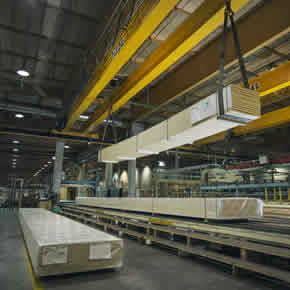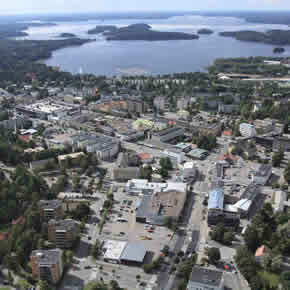
Producing sustainable building materials with 100% bioenergy
Despite its commitment to energy efficiency, the construction sector still uses a significant amount of global energy in the production of building materials. Metsä Wood has developed a solution: a self-sufficient mill which produces sustainable building materials with 100% bioenergy.
The European ‘Energy Performance of Buildings Directive’ requires all new builds to reach zero class energy by 2020; however, many architects believe this is not enough. Although an emphasis has been placed on regulating the energy used to operate buildings, the production of building materials has been found to be the most energy intensive phase.
According to Matti Kuittinen, an architect and researcher based at Aalto University, the energy used to produce the materials for building is ’50 times more’ than the energy used to operate it for a year.
He argues for an evaluation of the net energy balance of buildings over their whole life cycle; greater attention must be paid to materials and how they are manufactured and produced.
Joint production of bioenergy and construction materials
The Metsä Wood mill in Lohja, which is responsible for the production of Kerto Laminated Veneer Timber (LVL), sets an example for the industry. It works in a way that generates more bioenergy than is used in the process.
The sawdust and wood chips, which are generated in processing the engineered wood, are used for bioenergy production, as well as pulp. Next to the mill, a bio heating plant has been erected to capture the full potential of the production process.
The heat energy produced at the plant covers both the needs of the mill and the surrounding town, making the mill completely self-sufficient. The heat produced for the town of Lohja compensates for the purchase of electricity, which is needed for the mill’s operation.
Lohja is part of Finland’s national scheme to reduce greenhouse gas emissions by 80% by 2030. Metsä Wood’s bio heating plant, which covers 80% of the town’s heating, has helped Lohja to reach its target of a 15% reduction by 2016.
Visit Supplier's page
Latest news

21st February 2025
ASSA ABLOY EMEIA: Save valuable time and money with a seamless switch to programmable digital keys
In 2025, access management can be a whole lot easier. By making access part of their digital processes, businesses can put time-consuming key management and the cost of changing the locks firmly behind them. Making this switch is a lot easier than many people think, as ASSA ABLOY explains here…
Posted in Access Control & Door Entry Systems, Architectural Ironmongery, Articles, Building Industry News, Building Products & Structures, Building Services, Doors, Facility Management & Building Services, Health & Safety, Information Technology, Innovations & New Products, Retrofit & Renovation, Security and Fire Protection
21st February 2025
Showersave supports industry leaders in addressing Part L and Part G regulations
Showersave has sponsored and participated in a recent Building Insights LIVE roundtable on ‘Water & Energy Saving Innovations in New Build Housing’.
Posted in Articles, Bathrooms & Toilets, Bathrooms, Bedrooms & Washrooms, Building Associations & Institutes, Building Industry Events, Building Industry News, Building Products & Structures, Building Regulations & Accreditations, Building Services, Exhibitions and Conferences, Interiors, Pipes & Fittings, Plumbing, Retrofit & Renovation, Sustainability & Energy Efficiency
21st February 2025
GEZE: The importance of Specifying High Quality Door Closers on Fire Doors
Andy Howland, Sales & Marketing Director at GEZE UK, discusses why specifying high quality door closers on fire doors is important…
Posted in Access Control & Door Entry Systems, Accessibility, Architectural Ironmongery, Articles, Building Industry News, Building Products & Structures, Building Regulations & Accreditations, Building Services, Doors, Facility Management & Building Services, Health & Safety, Posts, Restoration & Refurbishment, Retrofit & Renovation, Security and Fire Protection
21st February 2025
Insight Data achieves ISO9001 recertification with zero non-conformities
Leading industry data specialist, Insight Data, has successfully achieved the prestigious recertification for ISO9001 with zero non-conformities for the fourth consecutive year.
Posted in Articles, Building Industry News, Building Regulations & Accreditations, Building Services, Information Technology, Research & Materials Testing
 Sign up:
Sign up: 